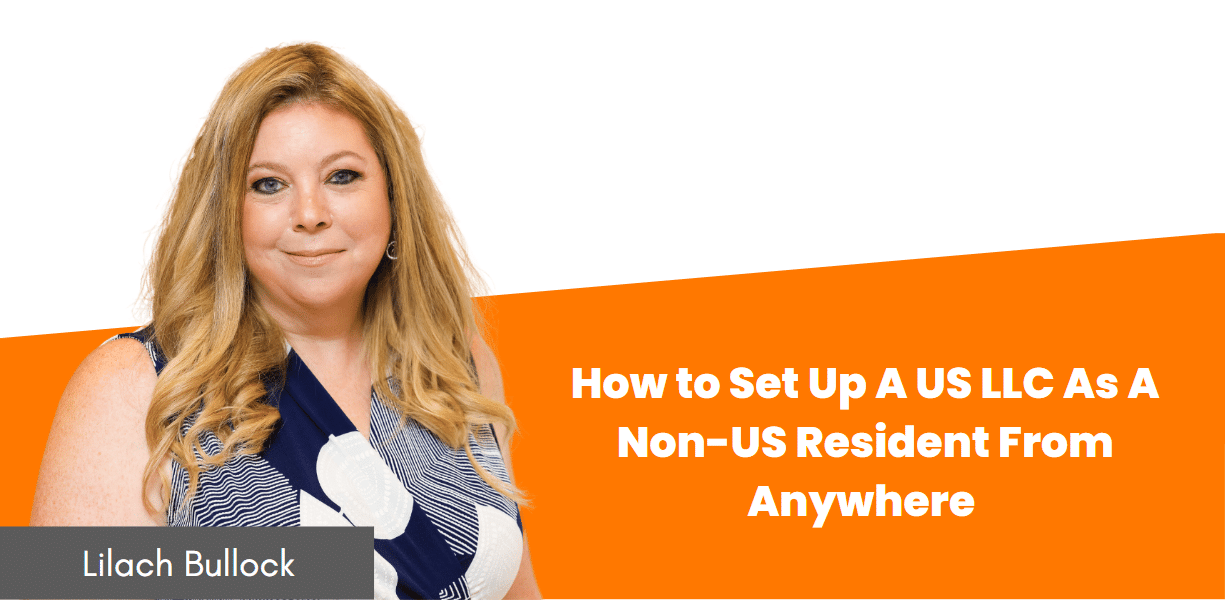Follow Lilach

How to Set Up A US LLC As A Non-US Resident From Anywhere
A limited liability company, or LLC, is a business structure that combines a corporation’s perks with a partnership’s flexibility. LLCs are popular among small businesses because they offer personal asset protection and pass-through taxation. This means that the LLC is not taxed on its profits. Instead, the taxes “pass-through” to the owners’ tax returns.
As a member of a US LLC, you will have access to the world’s largest economy, increased credibility, and flexible management options. Additionally, US LLCs can enjoy tax advantages that other business structures do not have.
If you’re a non-US resident looking to start a business in the States, you may wonder how to set up an LLC as a foreigner. The good news is that it’s relatively simple. All you need is a US address and a registered agent service.
In this guide, we’ll walk you through everything you need to know about setting up an LLC as a non-US resident, including the steps you’ll need to take and the paperwork you’ll need to fill out.
1. Choose a Business Structure
The first step in setting up any US business is choosing the proper business structure. There are several types of business structures to choose from, each with its own advantages and disadvantages. For example, a sole proprietorship is the simplest and most common type of business but offers no personal asset protection. On the other hand, corporations offer strong personal asset protection but can be more expensive and complex to set up.
LLCs fall somewhere in between these two extremes. They’re relatively simple, inexpensive, and offer personal liability protection. If your LLC is sued or incurs debt, you won’t be held personally responsible — your assets will be safe.
2. Choose a Business Name
Once you’ve decided to form an LLC, you need to choose a name for your business. The name you choose must be available and not too similar to any existing business. It’s a good idea to check with the US Patent and Trademark Office to ensure your chosen name isn’t already trademarked.
Your LLC’s name must also end with “LLC”, “L.L.C.”, or “Limited Liability Company”. For example, if you want to name your LLC “John Smith Consulting”, your full name would be “John Smith Consulting, LLC”.
3. Appoint a Registered Agent
All LLCs are required to have a registered agent. A registered agent is a person or company that agrees to accept legal documents on behalf of your LLC. This is important because it allows the government and other businesses to easily contact your LLC if you’re ever involved in a lawsuit.
You are also required to have a Registered Agent in the state where you form an LLC. For example, if you form an LLC in Texas, you’ll want to hire a registered agent in Texas.
The reason you’ll want to hire a Registered Agent Service, is that you can’t be your own Registered Agent. To be your own Registered Agent, you’d need to be a resident in the US state where you’re forming your LLC and have an address there. However, most non-US residents don’t have an address in the US and they don’t reside in the US.
There are many registered agent services to choose from, so do research before selecting one.
4. Register Your LLC
The next step is to register your LLC with the state government. This is typically done through the Secretary of State’s office. Each state has its LLC registration process, so you’ll need to check with your state’s office for specific instructions.
In most cases, you’ll need to file articles of organization and pay a filing fee. And this is where you’ll list your Registered Agent. You’ll enter their contact information in your articles of organization, or similar filing documents (depending on the state). According to the GovDocFiling guide, some states have extra requirements. For example, New York requires new businesses to publish their launch in local newspapers for a set period. And after your LLC is approved by the state, you can then get an Employer Identification Number (EIN) from the IRS, which is used for tax purposes and to open a business bank account.
5. Create an Operating Agreement
An operating agreement is not required in all states, but it’s a good idea to create one. An operating agreement is a document that outlines the ownership and management structure of your LLC. It also sets forth the rules and regulations for running your LLC.
The operating agreement should include the following information:
- The name of your LLC
- The address of your LLC’s principal place of business
- The names and addresses of your LLC’s members
- The duration of your LLC (if it’s not perpetual)
- The name and address of your registered agent
- The purpose of your LLC
- Whether your LLC will be managed by members or managers
Creating an operating agreement can help prevent disputes among the owners of your LLC and make it easier to resolve disagreements if they do arise. Plus, some banks and other businesses may require you to have an operating agreement before they do business with you.
6. Obtain Business Licenses and Permits
You may need to obtain specific licenses and permits depending on your business type. For example, businesses that sell food or alcohol typically need to obtain a permit from the health department.
You may also need a business license from your city or county, if you’re doing business there. Check with your local government office to find out what licenses and permits are required for your business.
7. Open a Business Bank Account
Once your business is set up, it’s time to open a business bank account. This is important because it will help you keep your personal and business finances separate. Plus, it makes it easier to track your business expenses and income for tax purposes.
When you’re ready to open a business bank account, bring along your LLC paperwork, EIN Confirmation Letter, and your passport. You may also need to provide a copy of your operating agreement. Once your account is open, you can start using it to manage your LLC’s finances. You can open an account by visiting the US (I recommend calling ahead of time) or there are some online banks you can use, like Mercury or Wise.
8. Comply With Annual Reporting Requirements
In most states, LLCs are required to file an annual report. This report provides the state with updated information on your LLC, such as the names and addresses of the current owners.
Filing an annual report is typically done online through the Secretary of State’s office. Be sure to check with your state’s office for instructions on filing your LLC’s annual report.
Now that you know how to set up a US LLC as a non-US resident, it’s time to start your LLC!
Conclusion
Congratulations on taking the first steps to start your LLC in the United States! Although a few extra steps are involved in setting up an LLC as a non-US resident, it can be well worth it for its benefits. Once your LLC is up and running, you’ll enjoy the personal liability protection and other advantages of having a US LLC.
Author Bio:

Matt Horwitz is the founder of LLC University, a website that teaches people how to form LLCs. Matt is the leading authority in LLC education and is featured in CNBC, Yahoo Finance, Entrepreneur Magazine, and US Chamber of Commerce. Matt holds a Bachelor’s Degree in business from Drexel University with a concentration in business law. LLC University®, established in 2010, was the first company to create free LLC courses in all 50 states.

Follow Lilach















